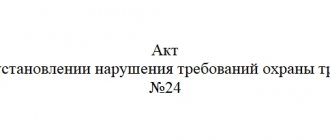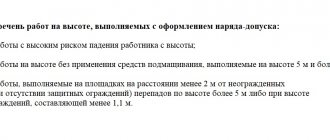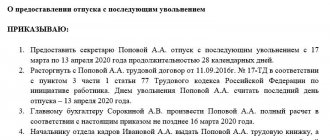Concept of labor protection
Note 1
The Constitution of the Russian Federation states that every citizen has the right to safe working conditions and health protection. In this regard, the Federal Law “On the Fundamentals of Occupational Safety and Health in the Russian Federation” was adopted.
Labor protection is a system of measures to preserve the life and health of workers in the process of carrying out their work activities. This system of measures includes legal, socio-economic, organizational, technical, treatment and preventive, rehabilitation and many other measures.
The state has established special standards and rules that are aimed at ensuring safe working conditions and preserving the life and health of the employee in the process of production activities. Labor protection requirements are mandatory for legal entities and individuals carrying out their activities:
Finished works on a similar topic
- Course work Ensuring safe working conditions 480 rub.
- Abstract Ensuring safe working conditions 280 rub.
- Test work Ensuring safe working conditions 250 rub.
Receive completed work or specialist advice on your educational project Find out the cost
- during the design, construction and operation of facilities;
- in the design of machines, mechanisms and equipment;
- in the development of technological processes;
- when organizing production.
Additional guarantees are provided for workers working in hazardous conditions.
There is a restriction on the use of women's labor in heavy work and work with hazardous working conditions, as well as in work involving heavy lifting that exceeds the maximum permissible standards.
The legislation provided additional rights for pregnant women, which set out rules for ensuring adequate conditions that meet the health and physiological characteristics of pregnant women.
Persons under 18 years of age are prohibited from working in jobs with harmful or dangerous working conditions, as well as in jobs that may harm their health: work in nightclubs and bars, transportation and sale of alcoholic beverages and tobacco products. Lifting and carrying heavy objects exceeding the maximum permissible limits is prohibited. The list of these works was approved by the Government of the Russian Federation and a special commission.
Need help creating a study plan? Specify a topic and receive a response in 15 minutes get help
Persons under 18 years of age applying for work are required to undergo a medical examination. And in the future, until they reach the age of 18, they are required to undergo a mandatory medical examination annually at the expense of the employer.
Persons under 18 years of age can take annual paid leave at any time convenient for them. The duration of vacation is 31 calendar days.
Employees under 18 years of age are prohibited from being sent on business trips or required to work overtime and at night, on weekends and holidays.
Each organization engaged in production activities and having more than 100 employees must create an occupational safety service at the enterprise or introduce the position of an occupational safety specialist. If the size of the organization is less than 100 people, then the occupational safety service or the position of occupational safety specialist is introduced by decision of the head of the organization.
If the organization does not have a labor protection service or specialist, the employer is obliged to enter into an agreement with special organizations that provide services in this area.
Article 219 of the Labor Code of the Russian Federation. The employee’s right to work in conditions that meet labor protection requirements
1. Considering that many of the rights of an employee in the field of labor protection, enshrined in Article 219 of the Labor Code of the Russian Federation, are specified in independent articles of the section “Labour Safety” and other sections, when commenting on it, references are given to the relevant articles of the Labor Code. In addition, many of the employee’s rights correspond to the already discussed specific responsibilities of the employer (Article 212 of the Labor Code of the Russian Federation), which give an idea of a number of employee rights, for example, to a workplace that meets labor protection requirements, information about working conditions in the workplace. In such cases, the text of the commentary to the article also contains a reference to the article on the responsibilities of the employer.
Individual employee rights are considered simultaneously with the guarantees enshrined in Art. 220 TK.
2. On the employer’s provision of the employee’s right to a workplace that meets labor protection requirements, see paragraph 4 of the commentary. to Art. 212.
3. On the employee’s right to social insurance against accidents at work and occupational diseases, see the commentary. to Art. 184.
4. On ensuring the employee’s right to receive reliable information about labor conditions and safety at his workplace, see paragraph 10 of the commentary. to Art. 212.
5. If an immediate danger to the life and health of a worker arises during work as a result of violation of labor protection requirements (except for cases provided for by federal laws), he has the right not to perform work until such danger is eliminated (for example, to refuse to work at heights without protective devices and when no safety belt).
In this case, the employer is obliged to provide him with another job while the danger is eliminated. If for objective reasons this is impossible, the employee’s downtime until the danger to his life and health is eliminated is paid by the employer in accordance with the law (see commentary to Article 157).
As follows from the contents of Part 7 of Art. 220 of the Labor Code, the employee also has the right to refuse to perform heavy work and work with harmful or dangerous working conditions not provided for in the employment contract. However, cases when an employee cannot exercise such a right are not specified in the Labor Code. Therefore, the employee has the right not to perform the named work even when their performance is caused by a transfer due to production necessity (Article 72.2 of the Labor Code) - clause 19 of the Resolution of the Plenum of the Armed Forces of the Russian Federation of March 17, 2004 No. 2.
When applying Article 219 of the Labor Code of the Russian Federation, it should be borne in mind that if in these cases it is impossible to provide the employee with other work, then his downtime, in our opinion, should be paid as downtime through no fault of his (Article 157 of the Labor Code).
An employee’s refusal to perform work in the cases listed above does not entail any adverse consequences for him, for example, the employee cannot be subject to disciplinary action.
6. On the provision of personal and collective protective equipment, see commentary. to Art. 221 and paragraph 3 comments. to Art. 212.
7. For training in safe labor methods and techniques at the expense of the employer, see the commentary to Article 225 of the Labor Code of the Russian Federation.
8. Issues regarding the elimination of jobs due to violation of labor protection requirements and professional retraining of workers released in connection with this are resolved by organizations independently.
The employer provides vocational training and retraining at his own expense in the organization, and, if necessary, in educational institutions of primary, secondary, higher vocational and additional education on the terms and in the manner determined by the collective agreement, agreements, as well as the employment contract (Article 196 of the Labor Code ).
9. The right of an employee to request an inspection of labor conditions and safety at his workplace by state supervision and control bodies corresponds to the corresponding powers of these bodies (see Articles 356 and 370 of the Labor Code).
In accordance with Art. 4 of the Federal Law of May 2, 2006 N 59-FZ “On the procedure for considering appeals from citizens of the Russian Federation” (SZ RF. 2006. N 19. Art. 2060), citizens have the right to apply personally, as well as send individual and collective appeals to government bodies, local governments and officials. The appeal can be expressed in the form of proposals and recommendations for improving legislation or improving socio-economic and other areas of activity of the state and society; in the form of a citizen’s application-request for assistance in the implementation of his constitutional rights and freedoms or the constitutional rights and freedoms of other persons; in the form of a complaint-request from a citizen for restoration or protection of his violated rights, freedoms or legitimate interests or the rights, freedoms or legitimate interests of other persons. The appeal can also be oral.
A state body, local government body or official, within 30 days from the date of receipt of the appeal, ensures its objective, comprehensive and timely consideration (if necessary, with the participation of the citizen who sent the appeal) and takes measures aimed at restoring or protecting violated rights and freedoms and legitimate interests.
According to the Law of the Russian Federation of April 27, 1993 N 4866-1 “On appealing to court actions and decisions that violate the rights and freedoms of citizens” (RF Air Force. 1993. N 19. Art. 685), an employee has the right to file a complaint against actions (decisions ), violating his rights and freedoms, either directly to the court, or to a higher state body, local government body, institution, enterprise or association, public association, official, civil servant.
A higher authority, association, official, civil servant in the order of subordination is obliged to consider the complaint within a month. If a citizen’s complaint is denied or he has not received a response within a month from the date of its filing, he has the right to file a complaint with the court.
A complaint can be filed by a citizen whose rights have been violated, or his representative, as well as, at the citizen’s request, by a duly authorized representative of a public organization or labor collective.
The complaint is filed at the discretion of the citizen either to the court at the place of his residence, or to the court at the location of the body, association, official, civil servant.
To file a complaint in court in accordance with Art. 5 of the said Law establishes the following deadlines:
- 3 months from the day the citizen became aware of a violation of his right;
- one month from the date a citizen receives written notice of the refusal of a higher body, association, official, civil servant to satisfy the complaint or from the date of expiration of a month after filing the complaint, if a written response to it is not received.
A deadline for filing a complaint missed for a valid reason may be reinstated by the court.
If an employee does not agree with the decisions taken on his complaint by the above-mentioned bodies and officials, he can file a complaint with the Commissioner for Human Rights in the Russian Federation, whose competence is enshrined in the Federal Constitutional Law of February 26, 1997 No. 1-FKZ “ On the Commissioner for Human Rights in the Russian Federation" (SZ RF. 1997. N 9. Art. 1011).
The right of trade unions, their associations, primary trade union organizations and their bodies to represent and protect the social and labor rights and interests of workers, incl. and in the field of labor protection, enshrined in Art. 11 of the Law on Trade Unions (see also commentary to Article 370).
According to paragraph 1, part 1 of Article 219 of the Labor Code of the Russian Federation, an employee has the right, personally or through his representatives, to participate in the consideration of issues related to ensuring safe working conditions at his workplace, and in the investigation of an accident at work or his occupational disease.
In cases where an employee has disputes with the employer regarding the application of labor protection legislation, a collective agreement, as well as the terms of the employment contract (for example, the employee is not transferred to another job in accordance with a medical report, a disabled person is involved in overtime work without his consent) , he can contact the labor dispute commission (LCC) at his place of work. In organizations where CTCs are not elected - directly to the court (see commentary to Article 391).
10. Only those categories of workers that are specified in Part 1 of Art. 213 Labor Code.
11. For compensation provided in connection with the performance of heavy work and work with harmful or dangerous working conditions, see the corresponding commentary. to Art. Art. 116, 117, 147, 222.
The employee’s right to safe working conditions
The Constitution of the Russian Federation guarantees every citizen the right to work in conditions that meet safety and hygiene requirements. This right is specified and guaranteed by the Labor Code.
Based on the basic provisions of the law, every employee has the right:
- to a safe workplace that meets labor protection requirements;
- compulsory social insurance against occupational diseases and industrial accidents;
- obtaining reliable information about working conditions in the organization, about the risk to employee health and about labor protection at work;
- an employee has the right to refuse to perform work if there is a danger to his life and health and labor safety requirements are violated at the enterprise;
- to provide personal and collective protective equipment at the expense of the employer and in accordance with labor protection requirements;
- ensuring safe production methods at the expense of the employer;
- the right to professional retraining in the event of liquidation of a workplace due to violation of labor protection requirements at the expense of the employer;
- the right to appeal to government authorities, the employer, trade unions and other authorized bodies on labor protection issues;
- an extraordinary medical examination in accordance with medical indications and with the obligatory preservation of the place of work and average earnings for the duration of the examination;
- the right to compensation established by law or an employment contract, provided that the employee is involved in heavy work with harmful working conditions.
So, the Labor Code of the Russian Federation legally enshrines a wide range of employee rights to work, which must meet all safety requirements and standards.
What is an employee entitled to?
the employee has the right to:
- conclusion, amendment and termination of an employment contract in the manner and under the conditions established by the Labor Code and other federal laws;
- providing him with work stipulated by the employment contract;
- a workplace that complies with state regulatory requirements for labor protection and the conditions provided for by the collective agreement;
- timely and full payment of wages in accordance with their qualifications, complexity of work, quantity and quality of work performed;
- rest provided by the establishment of normal working hours, reduced working hours for certain professions and categories of workers, provision of weekly days off, non-working holidays, paid annual leave;
- complete reliable information about working conditions and labor protection requirements in the workplace;
- professional training, retraining and advanced training in the manner established by this Labor Code and other federal laws;
- association, including the right to create trade unions and join them to protect their labor rights, freedoms and legitimate interests;
- participation in the management of the organization in the forms provided for by the Labor Code, other federal laws and the collective agreement;
- conducting collective negotiations and concluding collective agreements and agreements through their representatives, as well as information on the implementation of the collective agreement and agreements;
- protection of your labor rights, freedoms and legitimate interests by all means not prohibited by law;
- resolution of individual and collective labor disputes, including the right to strike, in the manner established by the Labor Code and other federal laws;
- compensation for damage caused to him in connection with the performance of labor duties, and compensation for moral damage in the manner established by the Labor Code and other federal laws;
- compulsory social insurance in cases provided for by federal laws.
- unmotivated refusal to hire is prohibited (Article 64 of the Labor Code of the Russian Federation). Upon written request, the employer is obliged to respond to the employee’s written request about the reasons for the refusal, which can be appealed in court.
- It’s more profitable to leave on a business trip before midnight rather than after, because...
this way the employee receives more per diem. Sick leave - if you fall ill within 30 days after dismissal, sick leave can be presented for payment at your last place of work (Part 2 of Article 13 of the Federal Law of December 29, 2006 N 255-FZ “On the provision of benefits for temporary disability, pregnancy and childbirth of citizens subject to compulsory social insurance").
Unpaid leave - in case of registration of marriage, birth of a child or death of a loved one, up to 5 days of unpaid leave are granted
- working pensioners have the right to 14 days of unpaid leave (Article 128 of the Labor Code of the Russian Federation)
- Everyone knows that pre-holiday days are shortened by one hour, but not everyone knows that the duration of work on a pre-holiday day in a six-day work week cannot exceed five hours (Article 95 of the Labor Code of the Russian Federation).
- the working day is shortened if the room temperature exceeds 28 degrees.
An increase in temperature of half a degree shortens the working day by an hour. So, at a temperature of 29 degrees, the working day lasts 6 hours, at 30 degrees - 5 hours, etc. (Table 1 Appendix 3 to the Sanitary Rules and Standards SanPiN 2.2.4.548-96 “Hygienic requirements for the microclimate of industrial premises”, approved by Resolution of the State Committee for Sanitary and Epidemiological Supervision of Russia dated 01.10.1996 N 21) Features of dismissal - During the probationary period, the employee has the right to terminate the employment contract by notifying the employer in writing three days in advance (Part 4 of Article 71 of the Labor Code of the Russian Federation), rather than working for two weeks. True, the employer also has the same right.
- dismissal for non-compliance with the position can only be based on the results of certification. In this case, it is necessary that you are warned about the certification 2 months in advance. The certification procedure itself must be provided for in local regulations. The employee must be familiarized with this document against signature at the time of hiring or at the time of approval of the act. In addition, based on the results of certification, the employer must offer you any vacant position (Article 81 of the Labor Code of the Russian Federation)
- reduction is possible only if the employee is given two months' notice. However, the employer, with the consent of the employee, has the right to reduce it before the expiration of this period by paying additional compensation proportional to the time remaining before the reduction (Article 180 of the Labor Code of the Russian Federation).
- If you have been laid off or fired due to the liquidation of the organization, contact the employment service.
This must be done within two weeks from the date of dismissal, because... if she cannot employ you within two months, the employer will be obliged to pay the average monthly salary for the third month (Part 2 of Article 178 of the Labor Code of the Russian Federation). Education - For employees who successfully study at state universities via correspondence, the employer is obliged to pay travel to and from the place of study once a year (Article 173 of the Labor Code of the Russian Federation).
However, there are rights that most workers are not aware of.
We have collected here the most interesting, from our point of view, examples. Recruitment
Business trip
Half-holiday
Irina Shevchenko
, head of the department for work with applicants of the Empire Personnel Holding






